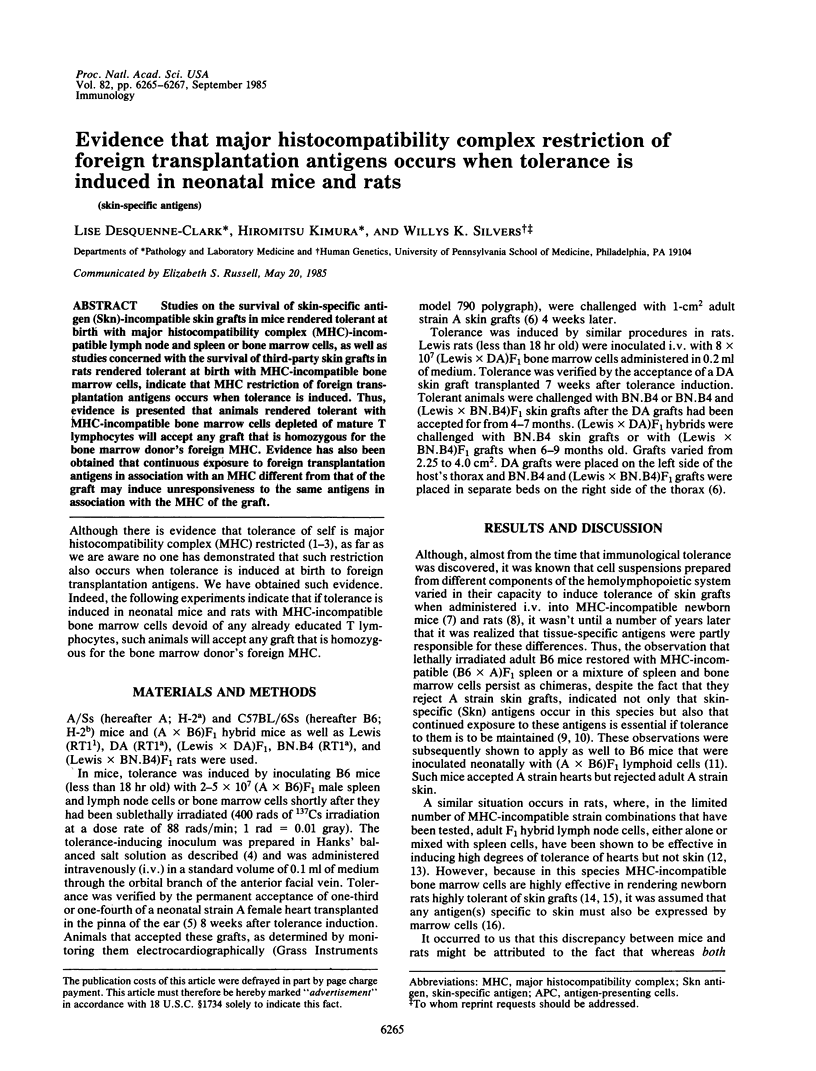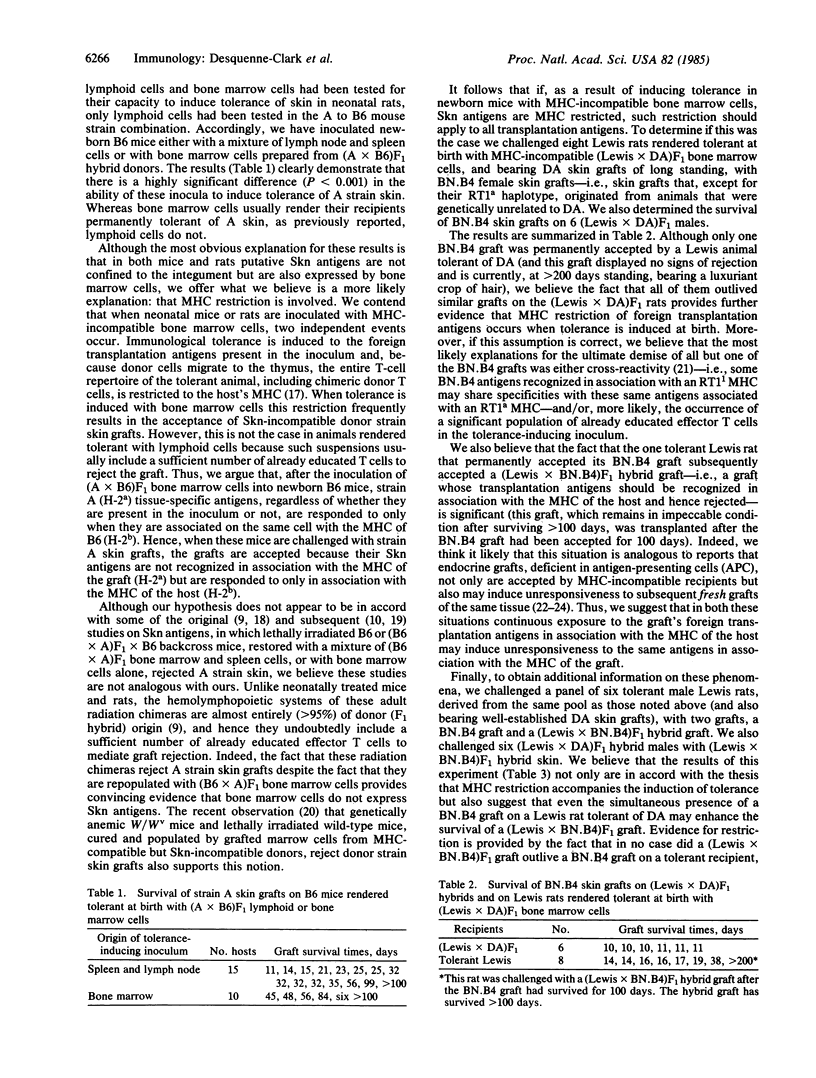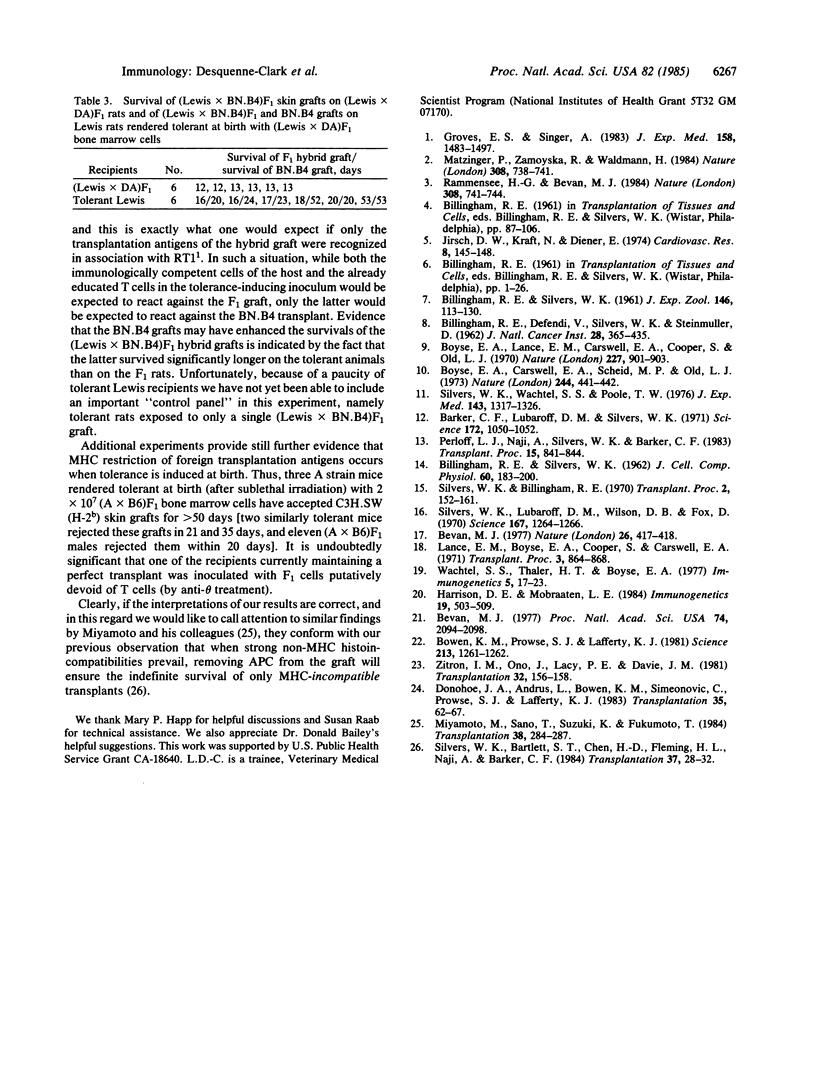Abstract
Studies on the survival of skin-specific antigen (Skn)-incompatible skin grafts in mice rendered tolerant at birth with major histocompatibility complex (MHC)-incompatible lymph node and spleen or bone marrow cells, as well as studies concerned with the survival of third-party skin grafts in rats rendered tolerant at birth with MHC-incompatible bone marrow cells, indicate that MHC restriction of foreign transplantation antigens occurs when tolerance is induced. Thus, evidence is presented that animals rendered tolerant with MHC-incompatible bone marrow cells depleted of mature T lymphocytes will accept any graft that is homozygous for the bone marrow donor's foreign MHC. Evidence has also been obtained that continuous exposure to foreign transplantation antigens in association with an MHC different from that of the graft may induce unresponsiveness to the same antigens in association with the MHC of the graft.
Full text
PDF


Selected References
These references are in PubMed. This may not be the complete list of references from this article.
- BILLINGHAM R. E., DEFENDIV, SILVERS W. K., STEINMULLER D. Quantitative studies on the induction of tolerance of skin homografts and on runt disease in neonatal rats. J Natl Cancer Inst. 1962 Feb;28:365–435. [PubMed] [Google Scholar]
- BILLINGHAM R. E., SILVERS W. K. Quantitative studies on the ability of cells of different origins to induce tolerance of skin homografts and cause runt disease in neonatal mice. J Exp Zool. 1961 Mar;146:113–129. doi: 10.1002/jez.1401460202. [DOI] [PubMed] [Google Scholar]
- Barker C. F., Lubaroff D. M., Silvers W. K. Lymph node cells: their differential capacity to induce tolerance of heart and skin homografts in rats. Science. 1971 Jun 4;172(3987):1050–1052. doi: 10.1126/science.172.3987.1050. [DOI] [PubMed] [Google Scholar]
- Bevan M. J. In a radiation chimaera, host H-2 antigens determine immune responsiveness of donor cytotoxic cells. Nature. 1977 Sep 29;269(5627):417–418. doi: 10.1038/269417a0. [DOI] [PubMed] [Google Scholar]
- Bevan M. J. Killer cells reactive to altered-self antigens can also be alloreactive. Proc Natl Acad Sci U S A. 1977 May;74(5):2094–2098. doi: 10.1073/pnas.74.5.2094. [DOI] [PMC free article] [PubMed] [Google Scholar]
- Bowen K. M., Prowse S. J., Lafferty K. J. Reversal diabetes by islet transplantation: vulnerability of the established allograft. Science. 1981 Sep 11;213(4513):1261–1262. doi: 10.1126/science.6791285. [DOI] [PubMed] [Google Scholar]
- Boyse E. A., Carswell E. A., Scheid M. P., Old L. J. Tolerance of Sk-incompatible skin grafts. Nature. 1973 Aug 17;244(5416):441–442. doi: 10.1038/244441a0. [DOI] [PubMed] [Google Scholar]
- Boyse E. A., Lance E. M., Carswell E. A., Cooper S., Old L. J. Rejection of skin allografts by radiation chimaeras: selective gene action in the specification of cell surface structure. Nature. 1970 Aug 29;227(5261):901–903. doi: 10.1038/227901a0. [DOI] [PubMed] [Google Scholar]
- Donohoe J. A., Andrus L., Bowen K. M., Simeonovic C., Prowse S. J., Lafferty K. J. Cultured thyroid allografts induce a state of partial tolerance in adult recipient mice. Transplantation. 1983 Jan;35(1):62–67. doi: 10.1097/00007890-198301000-00012. [DOI] [PubMed] [Google Scholar]
- Groves E. S., Singer A. Role of the H-2 complex in the induction of T cell tolerance to self minor histocompatibility antigens. J Exp Med. 1983 Nov 1;158(5):1483–1497. doi: 10.1084/jem.158.5.1483. [DOI] [PMC free article] [PubMed] [Google Scholar]
- Harrison D. E., Mobraaten L. E. Skin graft rejection in mice repopulated with marrow of the skin donor type: a Skn gene in a congenic line. Immunogenetics. 1984;19(6):503–509. doi: 10.1007/BF00403441. [DOI] [PubMed] [Google Scholar]
- Jirsch D. W., Kraft N., Diener E. Transplantation of the mouse heart--a useful research model. Cardiovasc Res. 1974 Jan;8(1):145–148. doi: 10.1093/cvr/8.1.145. [DOI] [PubMed] [Google Scholar]
- Lance E. M., Boyse E. A., Cooper S., Carswell E. A. Rejection of skin allografts by irradiation chimeras: evidence for skin-specific transplantation barrier. Transplant Proc. 1971 Mar;3(1):864–868. [PubMed] [Google Scholar]
- Matzinger P., Zamoyska R., Waldmann H. Self tolerance is H-2-restricted. Nature. 1984 Apr 19;308(5961):738–741. doi: 10.1038/308738a0. [DOI] [PubMed] [Google Scholar]
- Miyamoto M., Sano T., Suzuki K., Fukumoto T. Major-histocompatibility-complex-restricted male skin graft rejection responses in rats. Transplantation. 1984 Sep;38(3):284–287. doi: 10.1097/00007890-198409000-00017. [DOI] [PubMed] [Google Scholar]
- Rammensee H. G., Bevan M. J. Evidence from in vitro studies that tolerance to self antigens is MHC-restricted. Nature. 1984 Apr 19;308(5961):741–744. doi: 10.1038/308741a0. [DOI] [PubMed] [Google Scholar]
- Silvers W. K., Bartlett S. T., Chen H. D., Fleming H. L., Naji A., Barker C. F. Major histocompatibility complex restriction and transplantation immunity. A possible solution to the allograft problem. Transplantation. 1984 Jan;37(1):28–32. [PubMed] [Google Scholar]
- Silvers W. K., Billingham R. E. Contributions of the rat to the immunobiology of tissue transplantation. Transplant Proc. 1970 Mar;2(1):152–161. [PubMed] [Google Scholar]
- Silvers W. K., Lubaroff D. M., Wilson D. B., Fox D. Mixed lymphocyte reactions and tissue transplantation tolerance. Science. 1970 Feb 27;167(3922):1264–1266. doi: 10.1126/science.167.3922.1264. [DOI] [PubMed] [Google Scholar]
- Silvers W. K., Wachtel S. S., Poole T. W. The behavior of skin grafts incompatible with respect to skin alloantigens on mice rendered tolerant at birth with lymphoid cells. J Exp Med. 1976 Jun 1;143(6):1317–1326. doi: 10.1084/jem.143.6.1317. [DOI] [PMC free article] [PubMed] [Google Scholar]
- Zitron I. M., Lacy P. E., Davie J. M. Active suppression in the maintenance of pancreatic islet allografts. Transplantation. 1981 Aug;32(2):156–158. doi: 10.1097/00007890-198108000-00015. [DOI] [PubMed] [Google Scholar]


